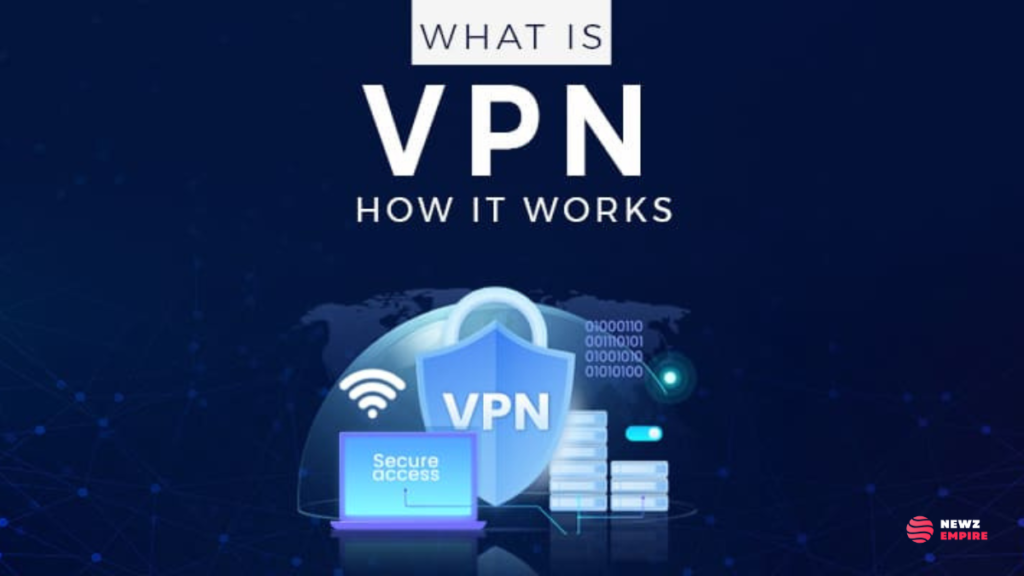As concerns about privacy are increasing, many people are using VPNs to hide their internet activities. You must be thinking, “What is a VPN and how does it work?” In this blog post we will explain everything about VPNs, including its definition, how it works, and why it is important.
Also Read : Infinix Hot 60 Pro : A Game-Changer with 320MP Camera, 7200mAh Battery, and Unique Features
Table of Contents
What is a VPN?
Let’s start with the basics. VPN means Virtual Private Network. It is a service that creates a private and secure connection between your device and the internet. When you use VPN, all your internet traffic is connected to the internet through an encrypted tunnel. Because of this tunnel, anyone who wants to track your online activity will not be able to access your data.
Why Do People Use VPNs?
The concept of “private network” is what attracts people to use VPN. Below are some of the reasons why people use VPN :
- Privacy : VPNs make it difficult for websites and advertisers to track you since they hide your genuine IP address.
- Security on Public Wi-Fi : When you use a public Wi-Fi network, like at an airport or coffee shop, your data could be vulnerable to hackers. But VPN encrypts your connection, so if someone tries to intercept your data, they will only see the encrypted data.
- Access to Geo-Restricted Content : Have you ever tried to access a website or watch a video but got a message that it’s not available in your country? VPN disguises your IP address’s location to make it look like you’re browsing from somewhere else.
Also Read : The Yamaha RX100 : A Legend Returns with a Fresh Look and Modern Features
How Does a VPN Work?

Understanding how to use a PIN shouldn’t be difficult. Here’s a basic explanation of what happens when you use a PIN :
Step 1 : Choosing a VPN Server
When you turn on your VPN, it immediately connects to your server. You can choose the best location for yourself, as most VPN providers have servers in many countries. You are given an IP address by your chosen server. Now websites and online services will show you the VPN address, not your actual IP address.
Step 2 : Encrypting Your Data
When you’re connected to a VPN, all the data you send and receive is sent through an encrypted “tunnel.” Encryption converts your data into a coded format that is difficult to decipher without the proper key. This process protects your information even if someone tries to intercept it.
Step 3 : Using Tunneling Protocols
VPNs use “tunneling protocols” to ensure secure data delivery. These protocols decide how your data is passed through the encrypted tunnel. Each protocol is designed to provide different levels of security and speed. IKEv2, WireGuard, and OpenVPN are some popular options. They all find a balance between speed and data security.
Step 4 : Sending Your Data
Your data finally reaches the internet after being encrypted and routed through a VPN server. When you connect to a website or online service, your data will appear to come from the VPN server’s IP address, not your real IP address. This keeps both your location and identity hidden.
Also Read : Redmi’s Lamborghini Edition With 24GB Ram & 1TB Storage
Key Parts of a VPN Connection
To understand VPN better, it is important to know some important terms :
- IP Address : The IP address is like your device’s Internet “address”. It tells you where you are browsing from and can be tracked. VPNs hide this and assign you a new IP address from their server location.
- Encryption : This process confuses your data and makes it unreadable. VPNs use high-level encryption to protect your information from prying eyes.
- Server : A server is a powerful computer that handles requests from other computers and stores information. The VPN industry’s global server distribution allows users to surf from different locations.
Also Read : Motorola 300MP Camera With 16GB Ram New Mobile
Types of VPN Protocols
VPNs offer several protocols, each with its own unique advantages. Let’s look at some of the popular protocols :
- OpenVPN : OpenVPN is a popular protocol known for its excellent security and versatility. It strikes a good balance between speed and security and is compatible with a wide range of devices.
- WireGuard : WireGuard is known for its speed and security, and it is a modern protocol that is rapidly gaining popularity. It is a great alternative for those who want speed without sacrificing security.
- IKEv2/IPSec : IKEv2/IPSec, which is widely used for mobile VPNs, can quickly reconnect if the connection is lost. This is beneficial for users who regularly switch networks.
Also Read : Top Best 5G Mobile Under 10000 ⚡November 2024
How VPN Encryption Works
When you connect to a VPN, your data is encrypted before it leaves your device; only the VPN server can decode it and send it over the internet, making it very difficult for anyone to understand or misuse your data if they intercept it. Most VPNs use 256-bit encryption, which is very difficult to crack and governments and banks also use it for their high-level security.
Because your data is encrypted before it leaves your device and only the VPN server can decrypt it and send it over the internet, it is extremely difficult for anyone to understand or misuse your data, even if they intercept it.
Also Read : Top 5 Gaming Laptop Under 20000 for Budget Gamers
What Happens When You Use a VPN?
When you PIN it, it protects your data in the following ways :
- Hides Your IP Address : VPN hides your real IP address and prevents your online location from being tracked by websites and others.
- Encrypts Your Data : Anyone who successfully intercepts your Internet connection will only see a jumble of useless data.
- Secures Public Wi-Fi Use : VPNs are very useful in public Wi-Fi areas where hackers often lurk. VPNs protect your data from these potential threats.
- Avoids Data Throttling : With a VPN, your ISP cannot see your data, making it difficult for them to restrict your access. If you use too much data, some ISPs may slow down your internet connection speed.
Also Read : Apple Macbook Air M1 : A Powerful Beast
Are VPNs Foolproof?
While vapours are great tools, they’re not the solution to every problem. Vapours can’t help you avoid :
- Malware and Viruses : You still need antivirus software because they don’t scan your data for infections.
- Data Leaks : “Data leak” happens when certain types of data, such as DNS requests, are occasionally exposed. Not all VPNs offer this protection, but some VPNs do.
- Tracking by Cookies : Websites use cookies to save user preferences. VPNs do not block these cookies, so websites can track some specific data about you.
Choosing a VPN That Works for You
- No-Log Policy : This means your browsing will remain private, even for the VPN provider, as VPN does not keep logs of your activities.
- Kill Switch : To avoid data breaches, a kill switch will disconnect your Internet if your VPN connection suddenly drops.
- Good Speed : Kabhi-kabhi VPNs internet speed ko slow kar sakte hain. Aise VPN ka chunaav karein jo high speed maintain karne ke liye jaana jaata ho.
- Multiple Server Options : You can experience surfing from different servers around the world using VPNs, which helps you access blocked content.
Also Read : How AI-Generated Content impact our daily life !
Final Thoughts on VPNs
To put it simply, Virtual Private Network (VPN) is a technology that helps you browse securely, hides your IP address, and protects your data. VPNs are essential for people who want to increase their online privacy and security. Although they are not perfect and may not be able to protect you from every online threat, a VPN can help you access information from different places, secure your connection on public Wi-Fi, and avoid tracking.
Frequently Asked Questions – VPN
What is a VPN?
People often search for VPN (Virtual Private Network) definition and how it works. This tool improves your browsing privacy by encrypting your internet connection, securing your online behavior, and hiding your IP address.
Why should I use a VPN?
People often search for benefits of VPN, such as securing sensitive data (like passwords and credit card details), accessing geo-restricted content, protecting data on public Wi-Fi, and maintaining anonymity from ISPs. VPN helps you in all these things, so you can enhance online privacy and security.
Are VPNs legal?
VPNs are legal in most countries, but in some countries (such as China, Russia, and Iran) their use is restricted or forbidden because of privacy and censorship concerns. In these countries, VPNs are used to hide people’s online activities and bypass content, which can become a source of concern for governments.
What’s the difference between a VPN and a proxy?
There is a lot of confusion between VPNs and proxies. A proxy only changes your IP address but it does not encrypt your internet traffic, so it does not provide that much privacy and security. In comparison, a VPN encrypts your data, which secures your online activity and protects your privacy. A VPN not only masks your IP address but your data reaches the internet after passing through an encrypted tunnel, which provides you more security and privacy.
Can VPNs protect me from everything online?
Many people start wondering whether VPN is a complete solution for internet security. VPNs are good tools for maintaining privacy and protecting data from ISPs and hackers, but they do not protect against viruses and malware. Therefore, antivirus software is still necessary for complete security. VPNs encrypt your internet traffic, but if your device is already infected, VPN cannot stop it.
How do I choose a good VPN?
When you are choosing a VPN, security features, speed, server locations, and the ability to bypass geo-restrictions are very important factors. It is recommended that you choose a reliable provider that provides strong encryption and does not track your online activity.



